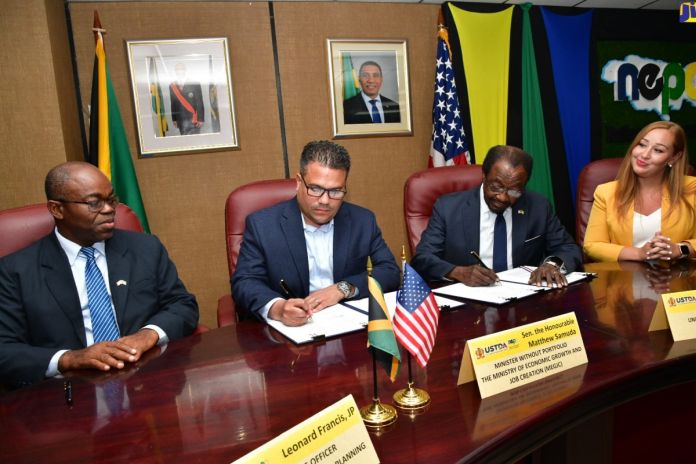By Chris Patterson
KINGSTON, Jamaica (DPI) – The National Environment and Planning Agency (NEPA) will be undertaking a study on the impact of reverse osmosis (RO) technology, which is a purification process that can be used to transform seawater into potable water.
Reverse osmosis is a multistage water filtration process that is used to remove up to 99.9 percent of contaminants such as dissolved salts, chemicals, unwanted minerals, and biological substances from seawater.
The resulting filtered water would, thereafter, be deemed fit for domestic use. The study is being facilitated through a $61-million technical assistance grant from the United States Trade and Development Agency (USTDA) and will be undertaken at 13 NEPA-approved RO sites islandwide.
It will also examine RO systems being utilised in at least four international jurisdictions to determine whether best practices in these territories can be adopted in Jamaica at the industrial or municipal scale and inform the permit process.
The undertaking was formalised during a grant agreement signing ceremony at the local agency’s Caledonia Avenue office in Kingston on Wednesday (July 31). USTDA is the US government’s overseas project preparation agency.
The agreement was signed by NEPA’s Chief Executive Officer (CEO), Leonard Francis, and USTDA’s country manager, Andean Region and Caribbean, Lambrini Kolios.
The proceedings were witnessed by minister without portfolio in the ministry of economic growth and job creation, senator Matthew Samuda, and United States (US) ambassador to Jamaica, His Excellency N. Nickolas Perry.
Senator Samuda, in his remarks, said the studies being programmed will assist Jamaica in providing reliable water to communities and ultimately achieving its water goals.
“I believe [that] through this study, we will be able to develop the standards and best practices, and perhaps even some guidance for the private sector who, from time to time, invest in these types of systems to ensure that we are able to solve the broader developmental challenge and actually allow us to achieve [Sustainable Development Goal] SDG 6 and Vision 2030 [Jamaica] by ensuring we are able to employ desalination where it’s necessary.”
While noting that the undertaking “won’t be necessary in every corner of Jamaica”, senator Samuda maintained that “it is necessary, today, for corners of Jamaica that will require reliable water to grow [and] to ensure a quality of life that is fitting for citizens, regardless of where they are from and where they live.”
Highlighting the project’s significance, minister Samuda said it will strengthen existing projects being undertaken by the government.
“Sixty-one million dollars [is] a lot for an environmental project of this nature. I assure you Ambassador [Perry that] we will use it efficiently and with the standards of governance that we’ve agreed [to] as a part of the project. But this is incredibly important for Jamaica, to bring all the factors necessary to make desalination a reality at a national scale.”
“We are working on our NRW (Non-Revenue Water) programme, we are working on increasing our storage capacity, which is woefully inadequate, and we are working on a large number of rainwater harvesting systems. We have also recently tabled our rainwater harvesting guidelines in the parliament that are being used by the Municipalities to help persons with building permits.
“But this [reverse osmosis technology] is the missing element, and the environmental studies being done because of this project will no doubt help the nation to achieve its water goals,” senator Samuda pointed out.
Ambassador Perry, in his remarks, said the agreement represents a major step in strengthening Jamaica’s water security.
“This USTDA/NEPA collaboration underscores the US’ and Jamaica’s shared goal of advancing environmental safety and sustainable management of water resources, which [are] essential for successful resilience against climate change.”
NEPA’s CEO Francis, who expressed gratitude for the undertaking, said, that through the project, critical insights will be gained for the safe and efficient operation of RO plants locally. The signing represents a win for proactiveness and a solutions-based approach to a challenge brought on by the triple global crisis of climate change, pollution and biodiversity loss.
“This crisis will lead to less potable water being available. Reverse osmosis provides us another tool in our toolbox to provide potable water to the Jamaican population and, by extension, our visitors,” Francis said.
USTDA’s country manager Kolios said the partnership represents the first-ever grant signing between the signatory entities and aims to advance environmentally sound and sustainable water infrastructure in Jamaica.
“This assistance is very timely, as the impacts of climate change and recent severe weather events have demonstrated the vulnerability and increased scarcity of water resources. Through USTDA’s assistance, we have the unique opportunity to help solve the pressing challenges through innovative water solutions that support Jamaica’s industries and economy, while preserving its ecological environment and, most importantly, ensuring a better future for the Jamaican people.”
Noting that the agency’s first projects in the island date back to 1992, Kolios said, “We have worked with both private and public-sector partners in Jamaica to support critical infrastructure development in the water and environment, clean energy, transportation and digital sectors.”





